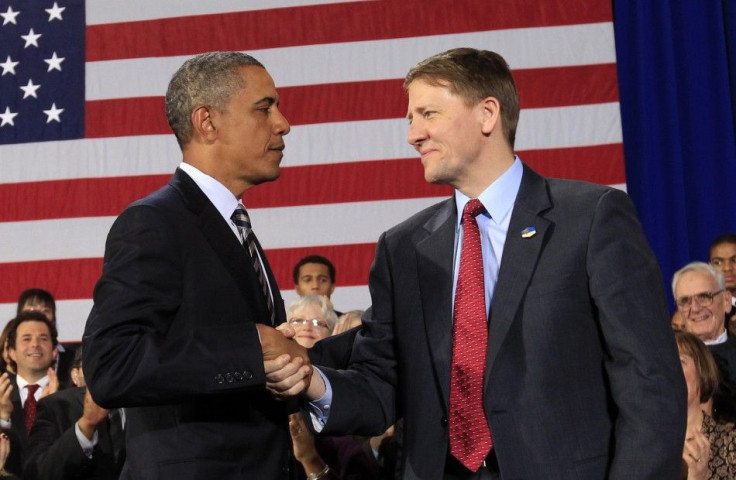Obama's Recess Appointments Reopen Murky Legal Debate

President Barack Obama's controversial appointments to the Consumer Financial Protection Bureau (CFPB) and the federal labor board on Wednesday have unearthed old concerns over the legality of recess appointments.
The legal controversy surrounding the appointment of Richard Cordray to be the CFPB director and three new members to the National Labor Relations Board (NLRB) centered on whether the Senate was actually in session.
The Senate was in a pro forma session, but no business was actually being conducted. Such a tactic has been used by Senate Democrats to stymie President George W. Bush from appointing his nominees.
Obama's move infuriated Congressional Republicans such as Senate Minority Leader Mitch McConnell, who said Wednesday that the president's decision -- made under the U.S. Constitution's Recess Appointments Clause -- put his nominees on shaky legal ground.
Indeed, the appointment immediately sparked a round of discussion and analysis about the president's power to do such a runaround on the Senate.
But as a staff attorney for the nonpartisan Congressional Research Service noted in a report, the Recess Appointments Clause is not without its ambiguities, and the president's use of this power in light of these ambiguities has given rise to significant political and legal controversy since the beginning of the Republic.
White House Defends Appointments
During a Wednesday press chat with White House Press Secretary Jay Carney, the first question asked regarded the legal and political buzz saw that the president had planned to walk through.
Carney, who refused to speculate about legal challenges, dismissed the idea that Senate's pro forma sessions were binding in any way.
Where pro forma sessions are used, as the Senate has done and plans to continue to do, simply as an attempt to prevent the President from exercising his constitutional authority, Carney said, such pro forma sessions do not interrupt the recess.
White House counsel and the Bush Administration's Office of Legal Counsel backed Obama's decision, Carney said.
One Bush Administration attorney in the Office of Legal Counsel, Vinson & Elkins partner John P. Elwood, blogged that he had supported the argument that pro forma sessions do not interrupt a recess.
I recognize that this is a novel and difficult question of constitutional law, with very few relevant judicial precedents, and there are arguments for both positions, Elwood wrote at The Volokh Conspiracy, a legal blog.
In support of his position, Elwood cited an early 20th century report from the Senate Judiciary Committee he said argued that the sort of pro forma sessions that are now going on don't give the Senate the opportunity to conduct any business, like advising and consenting to the president's nominees.
Breaking Precedent or the Constitution?
That Senate report was issued in 1905 after President Theodore Roosevelt two years earlier had forced through 160 officers, most of whom were military, in the 30-second window between the first and second session of the 58th Congress.
Decades later, President Harry Truman made a similar appointment while the Senate was out for only two days.
Since Truman, recess appointments have been made when Congress is out of session for at least 10 days leading Republicans to complain that Obama's appointment broke long-standing precedent, in House Speaker John Boehner's words. Other Republican critics of Obama's maneuver pointed to a 1993 Department of Justice brief suggesting that a recess should be longer than three days.
But as the Congressional Research Service pointed out in a report last month, there is no settled understanding for the length of time required for recess appointments. And the Constitution will do little to illuminate the matter, as it never specifies any number of days, the report said.
What the Constitution does discuss is how Congress adjourns for recess. In one clause, the Constitution says both houses of Congress must agree to any recess that lasts longer than three days, as one Bush administration lawyer noted in a Heritage Foundation blog post entitled A Tyrannical Abuse of Power.
The House of Representatives, Todd Gaziano, the Bush administration attorney, wrote Wednesday, did not consent to a Senate recess of more than three days at the end of last year, meaning that there was no recess and thus no authority to make the appointments.
Expect supporters of the CFPB to counter that the president has power under the Constitution to adjourn both Houses of Congress if the two cannot agree to end a session, as is the current case.
The Obama administration has not used that rationale to justify the appointment of Cordray and the three NLRB board members.
Nevertheless, it is clear that the lengthy and unsettled history of recess appointments will give parties on both sides of the issue plenty of ammo.
© Copyright IBTimes 2024. All rights reserved.





















